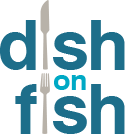Hi, Seafoodies!
Today we’d like to give a shout-out to all the Seafoodie moms-to-be: You rock! One of the most frequent questions we get at Dish on Fish is whether to eat seafood during pregnancy, and the answer is absolutely yes! In fact, the 2020-2025 Dietary Guidelines for Americans encourage everyone—especially pregnant women—to eat seafood two to three times a week. The only fish pregnant women need to avoid are king mackerel, shark, swordfish, tilefish, orange roughy, marlin and bigeye tuna (found in raw sushi)—which may be higher in mercury—and raw fish. (By the way, pregnant women should avoid all raw or uncooked fish, meat and poultry.) There are plenty of other seafood options to enjoy, including America’s top 10 favorite fish: salmon, canned tuna, pollock, crab, scallops, cod, clams, shrimp, tilapia and catfish! And if you still need your sushi fix, just order or buy sushi with cooked seafood—you can ask the chef or look for the label on store-bought sushi.
When you’re pregnant, it’s more critical than ever to focus on eating nutrient-dense foods, like healthy seafood, to meet your growing nutrient needs. One of the most important prenatal nutrients is the omega-3 fatty acid DHA, which is vital for a baby’s healthy brain and eye development. Since your body can’t produce this healthy fat on its own, it needs to come from your diet. Salmon and other fatty fish are among the best food sources of DHA. Nursing moms can reap the nutritional rewards of seafood, too, and pass DHA to their babies through their breast milk. This essential fatty acid will continue to aid babies’ development, as well as help them sleep better.
Eating sardines and salmon helps pregnant women get the calcium they need to build babies’ bones and muscles. Moms-to-be can meet their increased iron requirements by eating some clams, halibut, crab, shrimp or cooked oysters. And seafood provides a number of other powerhouse nutrients—including vitamin D, iodine and choline—that help ensure a healthy pregnancy.
Now for those who are trying to get pregnant: DYK that a seafood-rich diet may help boost fertility? For one thing, seafood is naturally high in protein and low in carbs, which has been associated with increased likelihood of pregnancy. Another benefit: omega-3 fatty acids. The fatty acids DHA and EPA have been shown to help reverse the inflammatory effects of omega-6s. This can be especially helpful for would-be mothers who are experiencing inflammation-related infertility issues such as PCOS or endometriosis. And research suggests that higher intake of omega-3s can help women restore ovarian function as they age. Men can benefit from eating more omega-3-rich foods, too. Studies have shown that increased dietary DHA can promote sperm viability and motility.
So, whether you’re meal-planning for a pre-pregnancy, prenatal or lactating diet, by all means enjoy your seafood! Think of it as a nutritional support system for both mom and baby.




No Comments